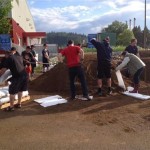
Fort McMurray flood highlights tar sands' threat to Mackenzie River Basin.
by Stephen Leahy
Record flooding in the heart of the Alberta tar sands dramatically illustrates their threat to Canada's 'Serengeti', the Mackenzie River basin. Only days before this week's flooding in Fort McMurray, a panel of international science experts warned that the nearly 200 square kilometres of toxic wastewater lakes near rivers like the Athabasca pose a direct threat one of the world's most important ecosystems.
"What happens in the Mackenzie River Basin has global consequences," Henry Vaux, a resource economist at the University of California told this reporter.
Three days of flooding in the Fort McMurray region has damaged roads, homes and eroded the ground around a main gas line causing a rupture according to media reports.
A breach in one of the wastewater impoundments in winter "would be virtually impossible to remediate or clean-up," they also warned in their report released Sunday June 9.
Canada will get plenty of international pressure if it does not begin to protect and properly manage this vast region that comprises 20 percent of the entire country Vaux told DeSmog.
That pressure could come very soon. Three days of flooding in the Fort McMurray region has damaged roads, homes and eroded the ground around a main gas line causing a rupture according to media reports. Government and industry officials continue to say the wastewater lakes that the industry calls "tailings ponds" that cover an area that's getting close to twice the size of the City of Vancouver are unaffected.
More rain is forecast in the region over the next few days.
"Extractive industries should be required to post a substantial performance bond which would be used to cover the costs of site clean-up should the enterprise fail financially or otherwise fail to fully remediate damage and destruction at the site in question," the report recommends.
That recommendation comes just days before the Alberta government acknowledged that oil sands companies have been unable to meet regulations requiring a decrease in the size of the wastewater tailings ponds. These sites have increased in size but Alberta will not impose any penalties and said the rules were too ambitious.
Researchers have compared the Mackenzie Basin to Africa's Serengeti Plain, an area of comparable size. Both ecosystems harbour high biodiversity and biological productivity the experts report. The Basin's global importance is reflected in its role in hemispheric bird migrations — many South American birds nest in the region. It is also important region in helping to stabilize the climate and plays a role in the health of the Arctic Ocean.
The Mackenzie Basin’s global importance is reflected in its role in hemispheric bird migrations — many South American birds nest in the region. It is also important region in helping to stabilize the climate and plays a role in the health of the Arctic Ocean.
The Mackenzie Basin is undergoing major changes with temperatures 2C warmer than 30 years ago. Permafrost soils containing hundreds of millions of tonnes of greenhouse gases are thawing, releasing those gases. The region's extensive peatlands are drying out. Lightning strikes lead to peatland fires that can smoulder for months and even years releasing huge volumes of CO2, said Vaux, who is also Chair of the Rosenberg Forum.
The local climate is additionally affected by the loss of Arctic sea ice. In 2012, the sea ice declined a record 11.83 million square kilometers by September — an area larger than Canada's 10 million sq km. There is about one month less snow cover now and glaciers in the Canadian Rockies have lost 25 percent of their ice. All of these changes are affecting the amount of water available for the Basin's rivers and lakes.
Though these changes are already significant, "and in some cases border on catastrophic," the report says, climate simulations suggest increased warming will lead to even higher temperatures of a level not seen on Earth in more than 10,000 years.
"Most participating stakeholders believe the region could adapt if the changes occur slowly," says the report. "However, rapid warming will make adaptation considerably more difficult."
Since the Basin encompasses three provinces and two territories it has a history of fragmented governance. The Mackenzie River Basin Board established in the 1990s was supposed to solve that problem but it had little support or funding said Vaux.
The River Basin Board needs to be reinvigorated with an independent scientific advisory council, receive full participation by First Nations and operate independent of governments and industry he said.
"This is the window of opportunity to act before the Mackenzie Basin degrades and becomes more difficult to manage," he said.
"We hope Canadians will be proactive rather than reactive."
© Copyright 2013 Stephen Leahy, All rights Reserved. Written For: StraightGoods.caOne Response to “Tailings ponds and more”
Sorry, the comment form is closed at this time.

 Stephen Leahy is an environmental journalist based in Uxbridge, Ontario.
Stephen Leahy is an environmental journalist based in Uxbridge, Ontario.
[…] Stephen Leahy, reposted from StraightGoodsNews, June 26, […]